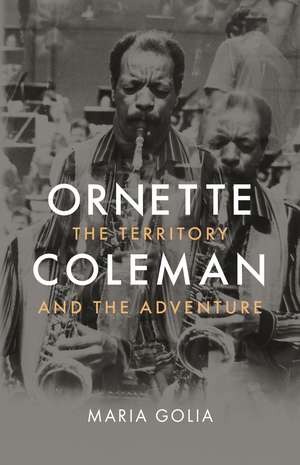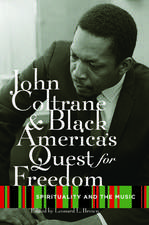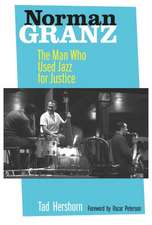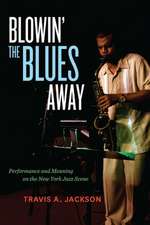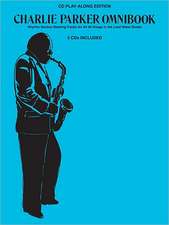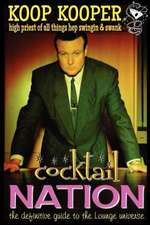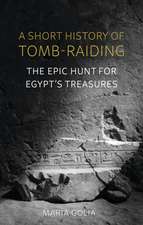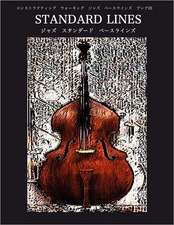Ornette Coleman: The Territory and the Adventure
Autor Maria Goliaen Limba Engleză Hardback – mai 2020
Ornette Coleman’s career encompassed the glory years of jazz and the American avant-garde. Born in segregated Fort Worth, Texas, during the Great Depression, the African-American composer and musician was zeitgeist incarnate. Steeped in the Texas blues tradition, he and jazz grew up together, as the brassy blare of big band swing gave way to bebop—a faster music for a faster, postwar world. At the luminous dawn of the Space Age and New York’s 1960s counterculture, Coleman gave voice to the moment. Lauded by some, maligned by many, he forged a breakaway art sometimes called “the new thing” or “free jazz.” Featuring previously unpublished photographs of Coleman and his contemporaries, this book tells the compelling story of one of America’s most adventurous musicians and the sound of a changing world.
| Toate formatele și edițiile | Preț | Express |
|---|---|---|
| Paperback (1) | 96.69 lei 3-5 săpt. | +19.60 lei 4-10 zile |
| REAKTION BOOKS – 6 iun 2022 | 96.69 lei 3-5 săpt. | +19.60 lei 4-10 zile |
| Hardback (1) | 158.69 lei 3-4 săpt. | +37.40 lei 4-10 zile |
| REAKTION BOOKS – mai 2020 | 158.69 lei 3-4 săpt. | +37.40 lei 4-10 zile |
Preț: 158.69 lei
Preț vechi: 170.00 lei
-7% Nou
Puncte Express: 238
Preț estimativ în valută:
30.37€ • 31.59$ • 25.07£
30.37€ • 31.59$ • 25.07£
Carte disponibilă
Livrare economică 25 martie-01 aprilie
Livrare express 08-14 martie pentru 47.39 lei
Preluare comenzi: 021 569.72.76
Specificații
ISBN-13: 9781789142235
ISBN-10: 1789142237
Pagini: 368
Ilustrații: 60 halftones
Dimensiuni: 140 x 216 x 36 mm
Greutate: 0.59 kg
Editura: REAKTION BOOKS
Colecția Reaktion Books
ISBN-10: 1789142237
Pagini: 368
Ilustrații: 60 halftones
Dimensiuni: 140 x 216 x 36 mm
Greutate: 0.59 kg
Editura: REAKTION BOOKS
Colecția Reaktion Books
Notă biografică
Maria Golia managed one of America’s premier progressive music venues, the Caravan of Dreams Performing Arts Center, in Fort Worth, Texas, Ornette Coleman’s hometown. Her previous books include Cairo: City of Sand, Photography and Egypt, and Meteorite: Nature and Culture, all also published by Reaktion Books.
Cuprins
Introduction
Part One: Coming Up
Part Two: Ignition
Part Three: Atmospherics
Part Four: Transmissions
Epilogue
Part One: Coming Up
Part Two: Ignition
Part Three: Atmospherics
Part Four: Transmissions
Epilogue
Recenzii
“Fittingly unconventional. . . . Ornette Coleman: The Territory and the Adventure is an atlas in prose, a guide to the territories of varied sorts—social, racial, aesthetic, economic, and even geographic—that Coleman came out of, traveled through, lived near, occupied, left behind, or transformed. . . . Golia covers a lot of territory in tight, direct language that illuminates Ornette Coleman’s life and work. . . . Most impressively, perhaps, she devotes a sizable section to Coleman’s cryptic and elliptical philosophy of music, which he called Harmolodics, without straining to defend it with academic triple-talk or dismissing it.”
"Golia aptly outlines the aesthetic dilemma, when ‘jazz had become aware of itself and its strengths.’. . . She writes with demystifying clarity about the manifestations of compassion and rigor behind Coleman’s search for ‘unison’ and the musical system he called ‘harmolodics.’ [She] notably grounds Coleman’s identity in his hometown, reconstructing an ‘idiosyncratic collage of radio broadcasts from Harlem, Western Swing fiddlers, Tejano two-steps, high-school marching bands, and the rhythm and blues that issued from storefront churches.’. . . Her book opens ears yet further to the transformative power of Coleman’s music.”
"Golia offers a wide-ranging biography of the great saxophonist, writing less about the man himself than about the people, places, and musical tendencies that converged to make him the 'patron saint of all things dissonant and defiant.' The approach suits Coleman, who was soft-spoken despite his stubborn nonconformity, and unaffected by the larger-than-life egotism of contemporaries such as Charles Mingus or Miles Davis."
“Illuminates the moral and political significance of the postwar avant garde. . . . [Ornette Coleman] was the shock of the new. . . . Golia writes scenically about Coleman’s birthplace, Fort Worth, Texas, where Jim Crow and music were everywhere. . . .With a pointillist’s talent for detail, [she] shows how Coleman’s origins in Texas blues gave way to abstraction on landmark records . . . ultimately leading him to create the musical paradigm he called ‘harmolodics.’. . . The ‘free’ in [Coleman’s] ‘free jazz’ is an ambivalent word. It doesn’t refer to the absence of oppression or musical rules, but instead the struggle to imagine a place beyond them both. In that sense, Coleman’s definition of freedom was radically inclusive, both politically and musically.”
“Golia takes a broader approach, situating the great saxophonist and composer in his cultural, social, and geographical contexts. Each of the four sections pivots on a particular time and place, establishing the territory then striking out on an adventure in a manner akin to a Coleman solo. . . . By deftly tracing these connections and transformations, Golia has created a valuable and highly engaging survey of Coleman’s harmolodic life.”
"One of the finest books on the power of place and influence in a musician's life."
"There are lots of fascinating anecdotes, stories, and previously unpublished photographs in Golia’s book. The author, who met Coleman in his hometown of Fort Worth, at the Caravan Of Dreams performing arts center, described the musician as 'unassuming and soft spoken.' She has compiled a detailed, interesting story of his career. Among the nuggets detailed are his appearance on Saturday Night Live in April 1979, how he got to know the writer William S. Burroughs, the story of his action-packed tour of Africa, how he became a noted painter, and the tales of his friendships with celebrities such as Yoko Ono and Patti Smith."
"Golia’s book describes the Ornette phenomenon with insight and eloquence. It’s laden with musical and social insights."
"A great new book. . . .. The book is much more than a conventional biography—you learn a lot about his childhood and artistic development, particularly the early years when he was wrestling with the blues and conventional R&B forms, and you learn about the whole Texas milieu he emerged from. But there’s also a great deal of discussion of his music and life philosophy, including extensive quotes from people in his bands, so if you’re at all a fan of his work and want to gain some real perspective on it, it’s pretty much a must-read. Highly recommended."
"Golia's well-researched volume paints a portrait of a man who looked different, ate differently (being a vegetarian in Texas was no joke), and, of course, played differently. . . . We learn a great deal about Coleman's musical beginnings, his subsequent motivations, and the broader landscape of which he was a part."
“A giant step in the right direction and the first significant book on Ornette Coleman since John Litweiler’s Ornette Coleman: The Harmolodic Life was published in 1992. . . . Golia is very good at contextualizing and explaining . . . and succeeds in exploring in a non-systemically musicological way the mysteries of harmolodics by shedding light on the more arcane side of Ornette’s vast artistic curiosity. Ornette Coleman: The Territory and the Adventure also is excellent in enhancing our biographical knowledge of Ornette’s early life in a very considered way."
"Fascinating... There is a great deal of new information in her book about Coleman, particularly about his later nonmusical artistic activities, his general philosophy, and the way that that he influenced other artists including from very different fields. Even those who consider themselves experts on the altoist will find much to learn from this well-written and scholarly book... The Territory And The Adventure has many bright moments, fresh stories, and fascinating information about the life and times of Ornette Coleman."
"[A] compelling and rewarding new book."
"A marvelous and unique biography of an equally unique artist. [Golia] covers his entire life in vivid detail with emphasis on the man, his associations, and his artistic methods."
"[A] brilliant new biography."
"Golia takes us on a guided tour, not just of Coleman’s mind and music but of the country and state that birthed him and made him into a permanent outlaw and outlier. She clearly designates the framework of the biography of this titanic figure, demonstrating that the individuals who may be said to define an era have generally distilled its characteristic forces and possibilities into a consistent body of work that has in turn transformed the times in which they lived and worked. In other words, Ornette is a mirror of the very America which often found it so hard to incorporate him into its artistic, musical, and cultural fabric."
"Golia’s forensic, scholarly, original Ornette Coleman: The Territory and the Adventure is a very welcome book. . . . Golia—perfectly placed to write this book as one-time manager of the Caravan of Dreams—expertly outlines Ornette’s place in a distinctly Texan musical heritage. . . . A fascinating, formidable study of Ornette, with all the seriousness and rigor his life and music deserve."
"The freedom that Golia describes is the freedom and openness to form friendships with artists from other areas of the arts. It is the freedom of someone who would go off to Morocco to seek out the musicians of JouJouka. These musicians had a profound effect on the way that Coleman developed multiple unisons and the harmolodic melding of the blues to create the Prime Time band. . . . The research that Golia has done is impressive and her book will be essential."
"Golia’s depiction of the mise en scene of Coleman’s life, and her insights into his persona, provide ample material to understand the saxophonist’s initial disruption and his long-term influence. . . . Ornette Coleman: The Territory and the Adventure gives readers a good sense of Coleman’s complex personality. He is described as quiet and, at other times, talkative; non-confrontational though bluntly expressive about being underpaid; sometimes ‘Buddha-like’ and sometimes withdrawn in the face of negative criticism. He had a vision that was compelling enough to draw a circle of accomplished musicians and to attract the admiration of accomplished non-musical artists. But, a brilliant vision wasn’t enough. He needed sufficient will to persist in the face of scathing criticism from jazz musicians and listeners. If you don’t know his music, listen."
"The jazz saxophonist Ornette Coleman, who didn’t like the term 'free jazz' which has been most often applied to him, was in that number. We jazz lovers tend to be a contrarian-minded bunch anyway. For some strange reason jazz is one of the few musical genres it’s still socially acceptable to put down. Too many notes or something. Luckily, we have a new biography by the journalist Golia that takes us inside his life and times. After having tenaciously fought to stay true to his eccentric musical vision throughout his long and eclectic career, it’s delightful to rediscover how accessible Coleman’s work can be."
"A professional account . . . of a heady dude, without cosmic junk and jargon."
“A spectacular new biography. . . . Golia has penned a labor of love and a thoroughly researched, righteous homage. Best of all, in my view, Golia gets Coleman’s ravenous intellectual curiosity. Her prose is sometimes dense with context, sometimes poetic and exalted, sometimes punchy (‘Jim Crow could not dictate what kind of music a person listened to.’) She gets that Ornette was never only a jazz musician. He was a thinker, a futurist, a cultural revolutionary. . . . Refreshingly, Golia describes references that informed Ornette’s voracious curiosity, like Derrida, Buckminster Fuller, Maya Angelou, the later Krishnamurti, and Guy Debord.”
"Golia contends that Coleman's particular vision of music, what he called Harmolodics, affected not only the shape of jazz but also that of other musical genres as well as poetry, visual art, film-making, and even architecture. It's a compelling argument, and Golia's book offers much interesting information concerning Coleman's upbringing and early music apprenticeship in his hometown of Fort Worth, TX, not generally considered a jazz capital but in these pages comes across as much more than a backwater."
"Lauded by some, maligned by many, Ornette Coleman forged a breakaway art sometimes called 'the new thing' or 'free jazz.' At the dawn of the Space Age and New York's 1960s counterculture, his music gave voice to the moment. Featuring previously unpublished photographs of Ornette and his contemporaries, this is the compelling story of one of America's most adventurous musicians and the sound of a changing world."
"Golia has succeeded in celebrating Coleman’s life of musical ‘adventure’ and arguing his status as a modern master."
"A book with superbly reproduced photographs. . . . Ornette Coleman did his own thing with graceful ease. This comes across strongly in the story of his life as told by Golia, and she is good at contextualizing the different phases of his musical career."
"An invaluable contribution not only to Coleman scholarship but also to the history of African-American music, culture, and commerce of mid-twentieth-century Fort Worth."
"Coleman’s status as a larger-than-life icon has tended to eclipse the soft-spoken, often enigmatic artist himself. Opposing this tendency is Golia’s wide-ranging new biography. . . . One of the book’s virtues lies in its foregrounding of Coleman’s own voice and the voices of his con-temporaries, with ample quotations throughout, many drawn from the author’s own interviews. . . . Golia’s book is scholarly and well researched, but it is not written exclusively or even primarily for academics and should be welcomed by fans and general readership."
"This is a deep book, far wider In scope than the typical wayward jazz musician’s life story. Golia is in unison with Ornette’s vision of the world. It’s a vision typical of the mystic, seeing everything at once, vividly, in totality, interconnected and interdependent. Locations, moments, theories continually modulating."
"Golia’s own achievement is to trace the path Coleman made from a rejected young local sax player to an icon of avant-garde art. . . . Golia takes a chronological approach with several key subplots to Coleman’s story. . . . Golia writes with informed affection for Coleman the man, but even more powerfully, she writes of how Coleman’s drive and creativity was formed through his distinctive path through American cultural history. . . . You may not always be clear on how that manifests in his sometimes difficult music, but Golia shows us how a harmolodic imagination like his was, for a time, both possible and necessary."
Finalist
“The history of jazz is often told as a geographical adventure in which a great art enlightens and assimilates a chain of territories in the course of world conquest. Golia revitalizes that narrative in exploring the life and genius of Ornette Coleman. This is the most incisive portrait we have of him—a joyous addition to the literature of music.”
“It’s always good to learn more about one of America’s greatest musicians, and Golia’s work has much that is new, especially (at last) a proper overview of Ornette’s experience in his hometown of Fort Worth, both in his youth and the 1980s. The Territory and the Adventure is the best book on Ornette Coleman yet.”
“Following Ornette's departure from the planet, his presence in the world only seems to increase, and his music’s influence will no doubt continue far into the future. The poetic conception of music, sound, and life in the broadest sense that Ornette embodied is addressed here through the terrific writing of Golia. This volume is an excellent addition to the ongoing study of one of the greatest improvising musicians of all time.”
